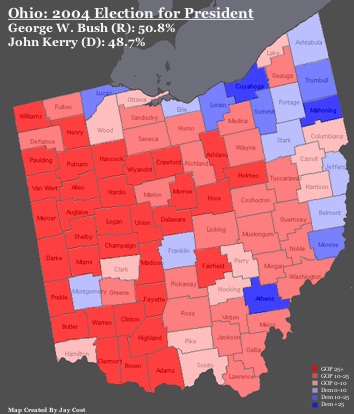Revisiting election 2004. Part 1

- Ohio results as published 2004
As the U.S.A. heads into a new election year, a string of GOP presidential candidates has demonstrated conclusively that each will need all the help s/he can get, to get into the White House. Thus it is timely, in this holiday season, to review the 2004 election.
Short story: Election Day 2004 involved more signs of election fraud, in more states, than any other election including that of 2000, when our not counting votes in Florida gave George W. Bush the White House without compelling him to win it.

- Exit polling in Venezuela
The 2004 anomalies were revealed when polling consultants Edison Media Research and Mitofsky International released final exit polls conducted in all states. A troubling pattern emerged, which has not to this day been explained away. Although the data were analyzed in an excellent paper by Prof. Steven F. Freeman, “The Unexplained Exit Poll Discrepancy,” there was no significant follow-up by the national political press. Undoubtedly this cavalier disregard for the fundamental right to vote contributed to fuel the big changes of 2008, including the rise of Barack Obama and the further decline of the news media in public esteem.
- Media rep 2004
Quick run-down, 2004:
- In 2004, contrary to results in every other election for the previous twenty years, there was a variance between exit polls and the published vote tally of more than two points in 33 of 51 jurisdictions.
- This variance amounted to a swing in each state of 4% or 5% or more to Bush.
- That is, regardless of which candidate won in those states, a significant variance allegedly occurred in every exit poll in all of them, and always in the same direction.
- This crucial swing occurred in all the close states: Colorado, Florida, Minnesota, New Hampshire, New Mexico, Ohio, Pennsylvania, Wisconsin and Iowa all had the same alleged ‘red shift.’
- Most of the close states seemingly shifted more than two points, a swing of 4% or 5% favorable to Bush, regardless of the size or region of the state, and regardless of whether the state ultimately went for Bush or Kerry.
- Exit polls from nine other states, less close, were also contradicted by a smaller swing toward Bush in the published vote tally. The same seeming swings to Bush occurred in the District of Columbia and Maryland.
- Thus four out of five states are alleged to have swung to Bush, in an election where previous polling had consistently indicated new voters, independent voters, and younger voters trending toward Kerry and/or away from Bush.
- This four-out-of-five swing is alleged for an election in which turnout increased, although increased voter turnout is generally held to favor the challenger against the incumbent.
- In four states, the swing from exit poll to published vote tally was enough to swing the state from Kerry to Bush–Ohio, Florida, New Mexico, and Iowa.
- These four states added up to 59 electoral votes, more than enough to change the outcome of the national election.
- Numerous election problems were reported on the ground from counties and precincts in Ohio, Florida, New Mexico and Iowa.
According to Professor Freeman, whose PhD in organizational studies came from MIT and who holds professorships at the University of Pennsylvania and at an international MBA program founded by Harvard, the swing between exit poll and vote tally is an anomaly even in just three battleground states. Take Pennsylvania, Ohio, and Florida alone, and as Freeman calculated, “The likelihood of any two of these statistical anomalies occurring together is on the order of one-in-a-million. The odds against all three occurring together are 250 million to one.”
“As much as we can say in social science that something is impossible, it is impossible that the discrepancies between predicted and actual vote counts in the three critical battleground states of the 2004 election could have been due to chance or random error.”
Even for a non-scientist, the statistical problem above seems fairly obvious: If the exit polls were simple mistakes, then they should have diverged from the vote tallies randomly. Honest mistakes should vary at different locations. Honest mistakes should vary in favor of different candidates, benefiting different parties. You don’t have a nationwide set of honest mistakes all magically benefiting one candidate. This is not random, it is a pattern.

- Freeman
It would also be near miraculous for a nationwide set of honest mistakes all to fall within a fairly short percentage range, just significant enough to affect the outcome of the election but not dramatic enough to trigger federal and state investigation under the law.
Disclaimer: It is only reasonable to read opinion polls and other polling with skepticism. Incessant polling can weaken the individual’s reliance on his/her own judgment, can plant suggestions, can intimidate reporters, and can manipulate public acceptance of the unacceptable. Following the 2004 election, an opinion poll was quickly published suggesting that most people were relieved—ironically–that the outcome was clear.
All well and good, if it was clear. But the integrity of vote counting is essential to our nation’s survival as a democracy. The horse-race obsession about who is ahead before the election often makes news media look silly. The question of who won the election, after the election, is fundamental.
Exit polls hit closer to the mark than do opinion polls. Exit polls are taken on the ground with people who show up to vote, are taken just after the voting, and are weighted to take into account a preponderance of one group. As Dr. Freeman points out, exit polls have been used globally to check and verify the validity of elections in countries including Germany and Mexico. When exit polls contradicted Eduard Shevardnadze’s claim that he had won election in the former Soviet country of Georgia, Shevardnadze was forced to resign under pressure from the U.S. among other nations.
Pundits’ disdain for the issue of what happened to the 2004 election not shared by the public
Writing about these issues soon after the 2004 election, this author focused initially on the small tilts that added up to a big tilt in the U.S. Electoral College. However, even then I pointed out that questions had also arisen affecting the popular vote count in ‘safe’ states. The responses below, from readers who vote, include this interesting anecdotal account:
“Margie,
A friend pointed me to your article “Did Bush lose the election?” which I found very interesting. I was also interested in your final comment about irregularities “even in safe states.”
I live in the “safe state” of North Carolina where something I observed may be worth passing along.
During the early voting period, the state Board of Elections was releasing daily turnout reports. The early voters were identified by their party registration. It occurred to me that comparing this year’s turnout with early voting in the 2000 election might reveal a trend.
At the close of early voting on Oct. 31, SBOE recorded 705,462 early voters. In 2000, 393,152 early voters were recorded. Four years ago, early voters were 46% Democrat and 38% Republican. This year, early voters were 50.4% Democrat and 36% Republican.
Given a 6-point net gain in Democratic turnout, it seemed reasonable to expect that John Kerry would gain at least several percentage points over Al Gore’s showing four years ago. But when the votes were tallied, Kerry registered virtually no improvement on Gore’s vote in North Carolina (Kerry 43.6%, Gore 43.2%).
Knowing who is voting doesn’t reveal how they are voting, and crossover voting has long been a feature of North Carolina elections. But there’s nothing to suggest that crossover voting was any different this year from four years ago. [emphasis added]
When a similar pattern was observed in parts of Florida, the response was that “Southern Democrats may have been more willing to vote for a moderate Southerner (Gore) than a Massachusetts liberal.” But that doesn’t explain why Democratic turnout increased while Republican turnout seemed to decrease.
This year’s early vote in North Carolina was 20% of the total vote. Four years ago it was 13.5% of the total. So, there’s a statistically significant sample to use as a basis for comparison. If a correlation exists between early voting patterns this year and four years ago, it seems pretty improbable that a significant jump in Democratic turnout would not have translated to some improvement for Kerry over Gore.
If Kerry were getting, say, 47% in North Carolina, that would have put another 130,000 votes in his column. It’s not enough to win the state’s 15 electoral votes, but a 4-point upward shift across the country is in line with the exit poll projection of a 51-48% popular vote lead for Kerry. And it would have moved Ohio and a couple other close states into his column.
It would be interesting to do these comparisons in states where the relevant data is available to see if Democratic turnout increased from 2000 to 2004, and if so, whether it translated to gains for Kerry over Gore.
I’m not ready to conclude there was vote manipulation. But there are a lot of questions about the results that need to be examined and answers provided.
Thank you for your efforts.”
“Dear Ms. Burns,
Thank you for your interesting, informative, and truthful article, “Did Bush
Lose the Election?”
The evidence of what you say has existed for quite some time now
- patent evidence of election fraud presaged by Avi Rubin at Johns Hopkins University
and echoed in the recent UC Berkeley study, by Zogby International as reported in IPS News, and- as Bill Simpich observes in the SF Bay View
- by former MIT mathematics professor David Anick, among others. Notwithstanding, the mainstream media continue to exclude from its purvue this most heinous and glaringly evident act of deception
- the defrauding of the American people of its vote and therefore of its sovereignty. By failing to lend their attention to this issue, the mainstream media act as aiders and abettors of a blatant attack against the security of the United States of America.
It is therefore extremely refreshing to hear someone valiantly speak out for the American people in our time of crisis. I thank you most profoundly for being one of the seminal figures to tell the truth about the Third Millenium scandal that is now gaining a reputation worldwide as “Votergate” or, as I also like to call it: “the NeoCons” [Election] Piracy 2004.”
[name redacted]
